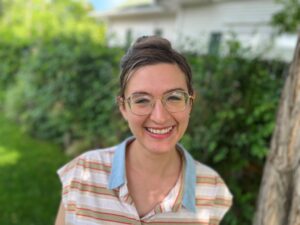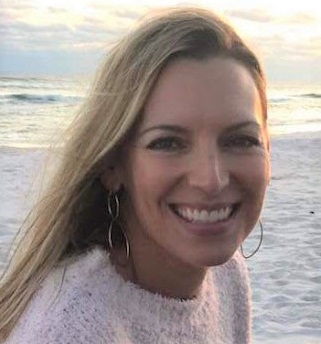VDS student’s field education, guided by VDS alumna, provided much-needed pastoral care at local domestic violence shelter
Since a leaked draft opinion from the Supreme Court of the United States striking down its previous Roe v. Wade decision was published online, attention has been focused on women’s reproductive health and freedom. (Ironically, the week following the leak was National Women’s Health Week.) The reasons why American women seek abortion are varied, ranging from the lack of financial resources to issues of emotional and physical health. A significant percentage of those seeking abortions are in or are fleeing from intimate partner violence (IPV). Thus, anti-choice legislation can jeopardize the safety of those seeking abortions, many of whom would be forced to remain connected to their abusive partner and exposed to continued violence. Continuing an unwanted pregnancy increases a woman’s chance of dying by homicide than by pregnancy-related causes – pregnant women face a 16 percent increased risk of dying by homicide compared to women who are not pregnant, and that risk is tripled for Black women.

Camille Kammer (she/her) came to Vanderbilt Divinity School with several years of experience in social work, where she had encountered situations of domestic violence and poverty. When it came time to select a field placement, she knew she wanted to apply her chaplaincy skills with women or queer folks outside of a traditional hospice, hospital or prison setting, and accompany them in a non-judgmental way. Viki Matson, VDS’ Director of Field Education and associate professor of the practice of ministry, knew just where to place her, and Kammer became the first VDS student to intern at the YWCA Nashville & Middle Tennessee.
“We had been eager to establish a relationship with the YWCA’s domestic violence program, and Camille was the perfect student with whom to launch that partnership,” Matson said. The challenges of the COVID-19 pandemic certainly impacted the internship. “But one of the unexpected benefits of the pandemic is that we were not limited to Nashville when it came to connecting her with a conversation partner who had similar experience. I immediately thought of Erika Callaway Kleiner (MDiv ’02), an alumna who has been working with survivors of domestic violence in the DC metro area for nearly two decades.”
VDS field education is framed by three tenets: doing, being and knowing. Doing refers to professional competencies and skills the student wishes to learn and how they plan on learning them. Being refers to cultivating wholeness through self-awareness, well-being, relationships and spirituality. Knowing refers to theological reflection and academic issues, questions or dilemmas they will consider during their field education.
Kammer approached her field education with the goals of listening and learning from her shelter coworkers’ expertise about how the shelter operated, how the city of Nashville goes about managing IPV cases, and how she could practice pastoral care in such a unique, non-religious setting. “I love working with women because there’s a certain amount of trust and relationship-building that I feel is ready to be nourished when working with them,” said Kammer, who is continuing in chaplaincy with a clinical pastoral education (CPE) residency in Tacoma, Washington.
The state of Tennessee ranks tenth in the nation for the rate at which men kill women, and the Metro Nashville Police Department responds to a domestic violence call every 20 minutes. The YWCA’s emergency shelter at Weaver Domestic Violence Center partners closely with the MNPD through the Lethality Assessment Program (LAP), an 11-question screening tool that is administered to anyone who has experienced IPV to determine their level of risk. If a victim screens as “high risk,” the MNPD immediately send them to the YWCA’s domestic violence hotline. The YWCA always reserves a percentage of beds at the shelter for those coming through the LAP program. The Weaver Center’s 51-room shelter is a fully staffed, resource-rich haven where women and children receive services to heal their trauma and prepare for lives free from abuse and coercion – the largest of its kind in the state.
“The only two places that have enough beds to offer the right to shelter are Washington DC and New York City. Here in Nashville, and in other major cities, the number of beds is woefully inadequate for the demand,” said Kammer. The process for accepting victims into shelters is complicated and sometimes deeply aggravating. One must be ‘actively fleeing’ a domestic violence incident, which means someone who has been surviving on their own for some time and has finally arrived at the shelter would not qualify.
Though the bulk of her internship was answering the YWCA’s domestic violence hotline in 15-minute, high intensity segments, Kammer eventually had the opportunity to create and manage support groups. After ensuring proper COVID-19 safety protocols and receiving support from the YWCA board, she was able to develop a support group curriculum with the support of her off-site supervisor, Callaway Kleiner.
The support groups followed a general curriculum outline designed by Kammer, but they were mostly shaped by the residents and what they needed to talk about. Kammer recalls one impactful week when the conversation turned towards the questions and complicated feelings surrounding the act of fighting back against an abuser, and whether that meant they were “the violent one” for not turning the other cheek. The conversation dovetailed with a discussion about how pacifism is misinterpreted in Christianity, where Kammer’s role was to provide a safe space for the women to chaplain each other.
“The women have so much more intimate knowledge about IPV than I do, and it felt meaningful to witness their discussions and active healing. That is what I would have hoped for from these support groups. I felt like I was doing what I was called to do and that I was where I needed to be,” said Kammer, who met weekly with Callaway Kleiner via Zoom over the course of the academic year as they considered sin, salvation, woundedness, healing and vocation.

“I really needed to go to divinity school because I had received some bad theology that was painful,” says Callaway Kleiner, who also arrived at VDS with experience in social work. Though she initiated the process to become ordained in the United Methodist Church, it was at VDS where she learned she did not necessarily need to be ordained to practice ministry. For her field education, Callaway Kleiner worked under Linda Manning, former director of Vanderbilt University’s Margaret Cuninggim Women’s Center and now the Interim Director at the Osher Center for Integrative Medicine. There she began her career in anti-sexual violence and anti-domestic violence work.
“A theme that would surface regularly in meetings with Camille was managing the tension between being a minister and being an anti-violence advocate and counselor. She didn’t neatly fit the expectations or assumptions of either vocation, so she needed to speak the language of both areas to bridge the gap between them. That work can be lonely, but it can also be creative and energizing,” said Callaway Kleiner.
Of her own field education experience, Callaway Kleiner says that she uses her MDiv degree every single day – it influences the perspective of her work and how she goes about doing it. “The VDS model for field education – doing, being and knowing – is incredibly powerful. I don’t have regular theological conversation partners in my work, so to this day I often find myself reflecting on issues using the case study format,” said Callaway Kleiner. “The VDS model takes the theology from the classroom and puts it into practice. It shows us how to actually be in the world to make change.”